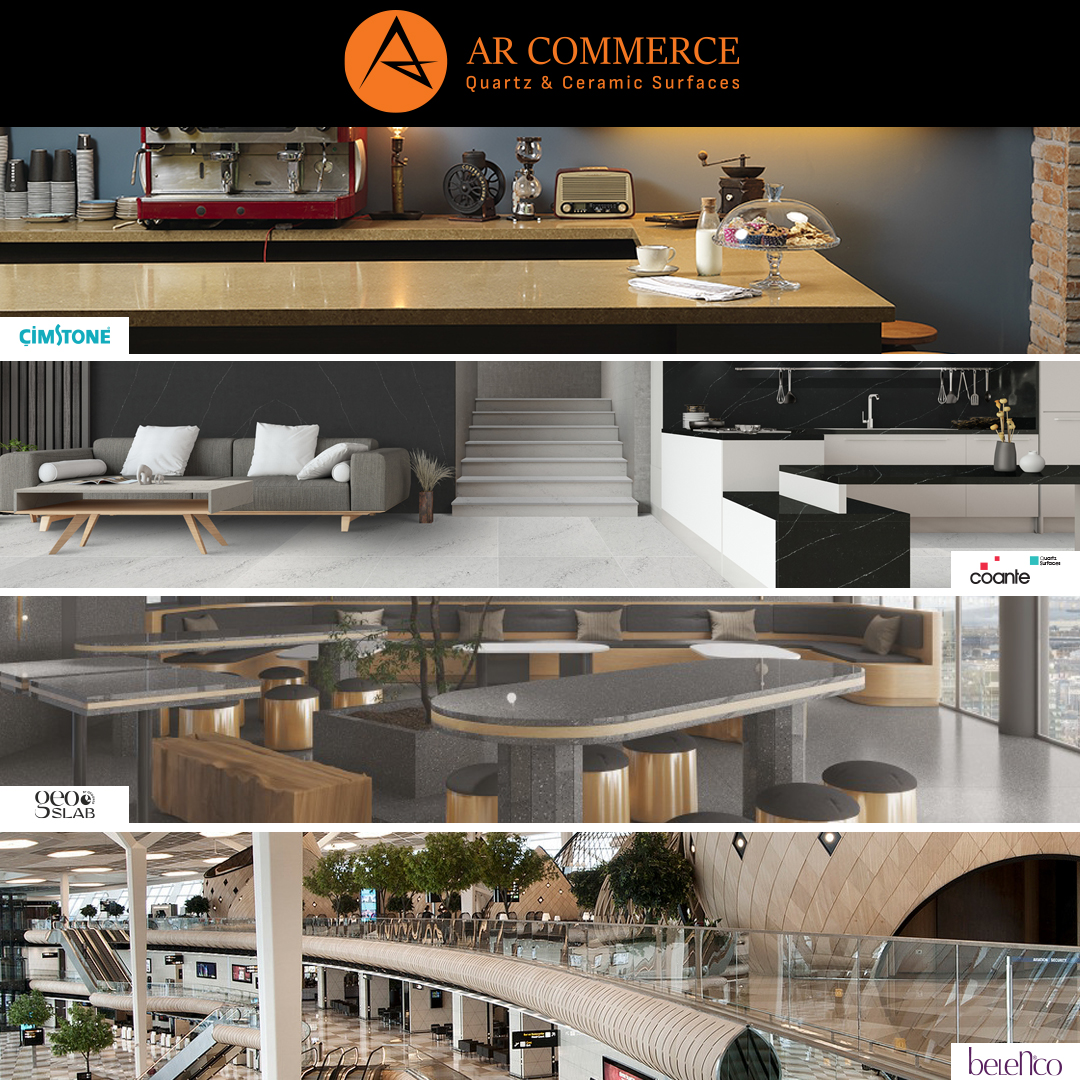Opportunities for the implementation of technical stone in the interior of restaurants
Technical stones offer a range of applications in interior design due to their versatility, durability and aesthetically appealing appearance. The technical stone brands offered by AR Commerce – Cimstone, Belenco and Coante fully meet the above characteristics. These materials are usually composed of natural stone aggregates bound together with resins or other binding agents. Here are some common applications of technical stone in interior design:
Countertops and work surfaces:
Engineered stones such as quartz and other composite materials are popular choices for kitchen and bathroom countertops. They are scratch, stain and heat resistant, making them durable and low maintenance.
Flooring:
Technical stones can be used for flooring, providing an elegant and contemporary look. Available in a variety of colours and patterns, their non-porous nature makes them resistant to water damage and easy to clean.
Wall cladding:
The interior walls can be enhanced with technical stones to create a modern and sophisticated look. These materials can mimic the look of natural stone while offering additional benefits such as uniformity of color and texture.
Backs of kitchens and bathrooms:
Technical stones are often used for kitchen and bathroom backsplashes. They provide a seamless and easy-to-clean surface while adding a touch of elegance to the space.
Furniture:
Some interior designers incorporate technical stones into furniture design, creating tables, shelves and other pieces that feature unique patterns and textures of the material.
Enclosure of the fireplace:
Technical stones are suitable for fireplace surrounds, offering a heat resistant and visually appealing solution. They are available in a variety of styles, allowing designers to choose options that complement the overall design of the space.
Stairs and steps:
Technical stones can be used for staircases and steps, providing a durable and slip resistant surface. This application is common in commercial spaces, residential interiors and public buildings.
Bathtubs and showers:
In bathrooms, technical stones are often used to build bathtubs and shower enclosures. Their non-porous surface helps prevent the growth of mold and bacteria.
Countertops and toilet surfaces:
Technical stones can be used for countertops in dining rooms or vanity surfaces in bathrooms. These surfaces are resistant to spills, stains and scratches, making them suitable for high traffic areas.
Custom Designs:
Interior designers can use the versatility of technical stones to create custom designs. Whether it’s a wall with unique features, a personally designed reception desk or other bespoke elements, these materials offer design flexibility.
Window sills and sills:
Technical stones are suitable for window sills and skirting boards, providing a durable and easy to maintain surface that can withstand exposure to sunlight and other environmental factors.
Countertops:
Technical stones can be used for countertops in dining rooms or conference rooms, combining aesthetic appeal with practicality.
Where in the interior?
Let’s take a look at the establishments – the restaurants and bars:
Bar tops:
Use technical stone for your bar tops to create a sleek and modern look. Provides durability and resistance to spills, stains and scratches.
Bars:
Place a technical stone in front of the bar for a visually appealing and cohesive design. This can create a stylish focal point for the bar area.
Backs of bars:
Place a technical stone as a backdrop behind the bar to make cleaning easier and add a touch of sophistication to the space.
Countertops:
Choose engineered stone for countertops in the bar area for its spill resistance and durability, especially in high-traffic areas.
Drink rails and ledges:
Use engineered stone for beverage rails and ledges along the bar to provide a comfortable and durable surface for patrons.
Dining tables:
Opt for technical stone worktops for dining tables. This not only adds elegance, but also ensures easy maintenance and durability.
Hostess and reception desks:
Implement technical stone for hostess stands or reception desks to create a welcoming and visually appealing entrance.
Buffet and serving areas:
Use technical stone for buffets and serving areas. Its durability and stain resistance make it suitable for catering.
Dividers and barriers:
Install technical stone dividers or partitions to create separate dining sections or private dining areas. This can be a functional and aesthetic addition to a restaurant layout.
Seating at the bar:
Use technical stone for the bar top and seating to provide a comfortable and stylish environment for visitors.
Toilets and surfaces:
Implement technical stone for toilets and surfaces for a hygienic and visually appealing solution.
Characteristic walls:
Create distinctive walls with technical stone to enhance the atmosphere of the restaurant. This can be particularly effective in upscale or themed venues.
Outdoor seating:
Extend the use of engineered stone to outdoor seating areas, such as patio countertops, to maintain a cohesive design aesthetic.
Custom installations:
Explore custom installations such as decorative columns, artistic panels or unique architectural elements using engineered stone to add a touch of creativity to your restaurant design.
When incorporating engineered stone into bars and restaurants, it’s important to consider the overall design theme, the level of maintenance required, and the specific needs of the space. Professional installation and regular maintenance are key to ensuring that engineered stone surfaces retain their aesthetic appearance and functionality over time.
Read more from the AR Commerce blog:
The best countertop for kitchen – How and why to choose quality?
What is the difference between technical stone and sintered ceramic?











